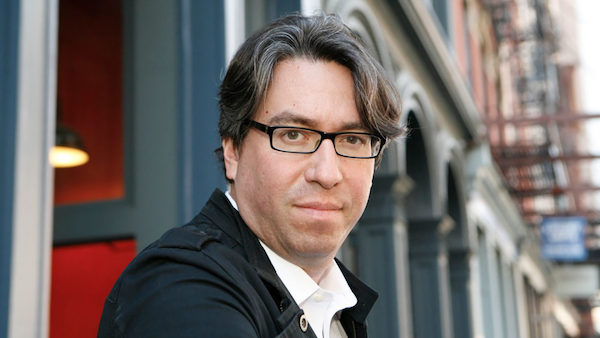Wachner, Trinity Wall Street forces mark 10th anniversary with a festive sampler

On September 12, 2019, lower Manhattan resumed its bustle of business and tourism after the memorial observances of the day before, and the white-pillared space of St. Paul’s Chapel—New York’s “Ground Zero church”—rang with the joyful noise of a new-music party.
Julian Wachner was both conductor and master of ceremonies for Thursday’s potpourri of ten short works and excerpts celebrating ten years of commissioning, premiering and recording contemporary music with his versatile ensembles, the Choir of Trinity Wall Street and NOVUS NY.
Attendees of the free concert snacked on platters of food and glasses of punch before finding their seats. A printed program offered artist biographies and the list of pieces to be performed, but program notes and sung texts were dispensed with in favor of Wachner’s brief introductions from the stage.
These often took the form of reminiscences about his and the ensembles’ role in shaping and/or introducing the pieces, which included three recent winners of the Pulitzer Prize: Ellen Reid’s opera p r i s m, Julia Wolfe’s oratorio Anthracite Fields, and Du Yun’s opera Angel’s Bone.
Wachner chose each excerpt, he said, to give “a snapshot of what the piece is like.” And in fact, the intermission-less hour-and-a quarter felt like sitting with a family album and imagining the experience behind each picture before flipping to the next.
The Trinity Wall Street choir led things off a cappella, with a gently ear-opening anthem, Given Sounds by Trevor Weston, which showed off the group’s lucid tone and exquisite tuning.
“learn to fly,” the third and final movement of David Lang’s these broken wings for flute, clarinet, percussion, piano, violin and cello, began explosively, then danced to a riff derived from Lennon and McCartney’s “Blackbird.”
Julia Wolfe, a co-founder with Lang of Bang on a Can, came next, with the powerful women’s chorus “Flowers,” an appeal for beauty amid the mining wasteland of Anthracite Fields. Members of the Bang-on-a-Can All-Stars reinforced the woodwinds and (of course) percussion for this stirring performance.
Composer Edward Thomas was on hand to describe his 2018 operatic setting of Eugene O’Neill’s Anna Christie LINK with considerable vigor and detail—and to mention that the following day would be his 95th birthday. The Colonial church’s drafty spaces were not kind to mezzo-soprano Melanie Long’s reedy voice, and her intense performance of “Anna’s aria” was sometimes covered by Thomas’s lush orchestration.
In comments read by Wachner, composer Jessie Montgomery linked her Source Code for string quartet to African-American spirituality and the choreography of Alvin Ailey. In what she called “a kind of dirge,” notes and chords slid to the blue side, and a lamenting first violin pointed the way to some polytonal preaching.
A duet for lyrical high tenor and tuba was just one of the distinctive features of the “Boy angel’s aria” from Angel’s Bone. Tenor Brian Giebler sustained a high-flying, ornate vocal line with gently echoing support from soprano Molly Netter.
The remarkable chorus returned to anchor the rest of the program, beginning with two movements from Paola Prestini’s The Imaginary World of Wild Order: A Mass. In the “Credo,” the singers intoned the text in natural speech rhythms before building a structure of vibrant sound that, along with tinkling percussion and glissando strings, seemed to rotate in space. Three soloists from the choir, most notably soprano Elizabeth Bates, floated clear, vibratoless tones through it all.
Whispers and whistling from the choir introduced the cheerful “Sanctus,” which featured audience participation in a simple riff, around which the choir wove counterpoint.
For this concert, Wachner selected what he called “user-friendly” excerpts from his own mystical-biblical opera REV. 23, beginning with the potent soprano aria “Blood Rubies,” in an arresting performance by Colleen Daly, whose richly-inflected voice rose easily over the surging orchestra.
Wachner described the aria “Beyond Paradise” as a “pop ballad,” and in fact mezzo-soprano Long’s sensitive phrasing could have used a touch of pop-style amplification to lift it over Daniel Schlosberg’s robust, syncopated piano.
Composer Ellen Reid took the stage briefly to introduce the mother’s dream aria from this year’s Pulitzer honoree,
p r i s m. This gave singer Long her best outing of the night, as her strong lower register kick-started the character’s disturbed dream vision amid swirling tones from chorus, harp and percussion.
Philip Glass’s vast Symphony No. 5 premiered twenty years ago, but the recently-released set by Wachner, the Trinity choir, NOVUS, and other musicians at Trinity Church is the first made by unified forces recorded in a single location. An echo of that occasion—an arrangement, sanctioned by the composer, of the final movement (“Dedication of Merit”) for chamber orchestra and chorus—closed Thursday’s concert.
It was hard to imagine scaling such globe-spanning music down to chamber size, but in the event the dozen or so musicians plus organ made a suitably mighty noise to accompany Glass’s vision of a peaceful and just world from Hindu scriptures. A quintet of soloists from the choir (led by the full-toned soprano of Meg Dudley) alternated verses of the hymn with the expressive chorus, sending the audience out with a hopeful message for September 12—the day after, the year after, the century after.
“Candlelight Baroque,” a new concert series of Trinity Church Wall Street, debuts with countertenor Daniel Taylor, soprano Molly Netter, and lutenist Sylvain Bergeron in music of the 17th and 18 centuries, 7 p.m. Friday in St. Paul’s Chapel. trinitywallstreet.org; 212-602-0800.






